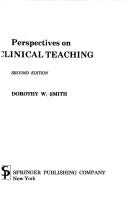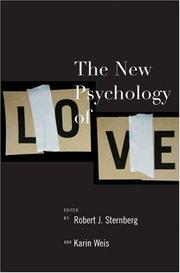| Listing 1 - 10 of 13 | << page >> |
Sort by
|

ISBN: 9780826109361 0826109365 9780826109330 0826109330 1306083850 9781306083850 9781785398698 1785398695 9780826109354 0826109357 Year: 2014 Publisher: New York, NY
Abstract | Keywords | Export | Availability | Bookmark
 Loading...
Loading...Choose an application
- Reference Manager
- EndNote
- RefWorks (Direct export to RefWorks)
This incisive text provides a comprehensive tour of both classic and contemporary theories and research on the how and why of human love. In addition to presenting the major biological, social, and cultural theories that have been developed on this topic, the book looks at what research has shown us about such essential issues as basic attraction, the life course of relationships, how personality and environment affect love, and how therapeutic interventions can sometimes improve relationships.
Love. --- Interpersonal attraction. --- Interpersonal relations. --- Attraction, Interpersonal --- Interpersonal relations --- Affection --- Emotions --- First loves --- Friendship --- Intimacy (Psychology) --- Human relations --- Interpersonal relationships --- Personal relations --- Relations, Interpersonal --- Relationships, Interpersonal --- Social behavior --- Social psychology --- Object relations (Psychoanalysis)

ISBN: 0300116977 9780300116977 Year: 2006 Publisher: New Haven Yale university press
Abstract | Keywords | Export | Availability | Bookmark
 Loading...
Loading...Choose an application
- Reference Manager
- EndNote
- RefWorks (Direct export to RefWorks)
316.647.2 --- 392.6 --- 177.61 --- Love --- -Affection --- Emotions --- First loves --- Friendship --- Intimacy (Psychology) --- Liefde. Aanhankelijkheid --- Seksualiteit. Seksueel leven. Concubinaat. Samenwonen. Prostitutie. Erotiek. Seksuele gebruiken. Liefdeskunst --- Liefde. Genegenheid --- Psychological aspects. --- -Liefde. Aanhankelijkheid --- 177.61 Liefde. Genegenheid --- 392.6 Seksualiteit. Seksueel leven. Concubinaat. Samenwonen. Prostitutie. Erotiek. Seksuele gebruiken. Liefdeskunst --- 316.647.2 Liefde. Aanhankelijkheid --- -177.61 Liefde. Genegenheid --- Affection --- Psychological aspects --- Relation interpersonnelle --- Tendresse
Book
ISBN: 1316711986 1316713318 1316488934 1107139619 1316505189 Year: 2016 Publisher: New York : Cambridge University Press,
Abstract | Keywords | Export | Availability | Bookmark
 Loading...
Loading...Choose an application
- Reference Manager
- EndNote
- RefWorks (Direct export to RefWorks)
The Psychologist's Companion, 6th edition is written for students, young professionals, and even mid-career scholars. It is the most comprehensive guide available to both written and oral communication processes for academic psychologists. It covers the topics necessary for career success, including planning papers, writing papers, presenting data, evaluating one's papers, writing grant proposals, giving talks, finding a book publisher, doing job interviews, and doing media interviews. Because the book is in its sixth edition, it is market tested for success in reaching and engaging its readers. Two special (new) pedagogical features are 'Experience is the best teacher', which draws on the authors' personal experiences to help make the book more personalized and exciting to readers, and 'What's wrong here', which gives readers an opportunity for active learning while they read the book. The authors have written the book in a personable and often humorous style that will keep readers engaged.
Report writing. --- Psychological literature. --- Psychology literature --- Psychology --- Research paper writing --- Research report writing --- Term paper writing --- Authorship
Book
ISBN: 9780511762024 9780521195713 9780521144827 9780511860324 0511860323 0511856849 9780511856846 9780511858581 0511858582 051176202X 9781282941861 1282941860 9786612941863 6612941863 0521195713 0521144825 0511861834 1107205077 0511859457 0511857713 Year: 2010 Publisher: Cambridge New York Cambridge University Press
Abstract | Keywords | Export | Availability | Bookmark
 Loading...
Loading...Choose an application
- Reference Manager
- EndNote
- RefWorks (Direct export to RefWorks)
The Psychologist's Companion is intended for students as well as young professionals and writers at all stages of their careers seeking inspiration and guidelines for better scientific writing. This book is also a resource for researchers in related fields. It has been comprehensively updated, revised, and extended for its fifth edition and includes the latest style guidelines of the American Psychological Association's Publication Manual (sixth edition, 2009) as well as chapters encompassing the entire research process from doing literature research and planning an experiment to writing the paper. It features new chapters on literature research; ethics; and generating, evaluating, and selling ideas. The Psychologist's Companion also provides information on writing book proposals, grant proposals, and lectures.
Report writing. --- Psychological literature. --- Psychology literature --- Psychology --- Research paper writing --- Research report writing --- Term paper writing --- Authorship --- Health Sciences --- Psychiatry & Psychology

ISBN: 1316040593 051181870X 0521896983 0521721792 Year: 2008 Publisher: Cambridge : Cambridge University Press,
Abstract | Keywords | Export | Availability | Bookmark
 Loading...
Loading...Choose an application
- Reference Manager
- EndNote
- RefWorks (Direct export to RefWorks)
What is hate and why is there so much of it? How does it originate, and what can we do about it? This book opens with a discussion of how hate makes its presence felt in the real world, discussing various definitions and theories of hate. Next it describes a duplex - two-part - theory of hate. According to the first part of the theory, hate has three components: negation of intimacy, passion, and commitment. According to the second part of the theory, this structure of hate originates from stories people create about the target - that, say, a group comprises enemies of God, or monsters, or vermin, or power-crazy tyrants, or any of a number of other stories. The authors discuss hate in the context of interpersonal relationships, survey the role of propaganda in inciting hate and analyze the role of hate in instigating terrorism, massacres, and genocides.
Hate. --- Hate --- Emotions --- Behavior and Behavior Mechanisms --- Psychiatry and Psychology --- Social Sciences --- Psychology --- Hates --- Behavior And Behavior Mechanism --- Regret --- Feelings --- Emotion --- Feeling --- Regrets --- Hatred --- Aversion --- Health Sciences --- Psychiatry & Psychology
Book
ISBN: 1108674380 1108571484 1108658229 110847568X 9781108475686 9781108468770 1108468772 Year: 2019 Publisher: Cambridge : Cambridge University Press,
Abstract | Keywords | Export | Availability | Bookmark
 Loading...
Loading...Choose an application
- Reference Manager
- EndNote
- RefWorks (Direct export to RefWorks)
This is a much-needed development from the first edition that provides an update on the theory and research on love by world-renowned scientific experts. It explores love from a diverse range of standpoints: social-psychological, evolutionary, neuropsychological, clinical, cultural, and even political. It considers questions such as: how men and women differ in their love, what makes us susceptible to jealousy and envy in relationships, how love differs across various cultures? As the neuropsychological basis of love is examined, this study showcases what attracts people to one another, why love has developed the way it has over time, and what evolutionary purpose it serves. It also analyses why and when love relationships both succeed and fail, which means readers will be rewarded with a better understanding of their own relationships and those of others, as well as what can be done to build a lasting, loving relationship.
Love --- Affection --- Emotions --- First loves --- Friendship --- Intimacy (Psychology) --- Psychological aspects. --- Love - Psychological aspects
Book
ISBN: 9781305644656 1305644654 Year: 2017 Publisher: Boston (Mass.) : Cengage Learning,
Abstract | Keywords | Export | Availability | Bookmark
 Loading...
Loading...Choose an application
- Reference Manager
- EndNote
- RefWorks (Direct export to RefWorks)
Cognition. --- Cognitive Science. --- Cognitive psychology --- Cognitive psychology. --- Psychologie. --- Psychology. --- cognition. --- psychology.

ISBN: 9780521721790 9780521896986 9780511818707 Year: 2008 Publisher: Cambridge Cambridge University Press
Abstract | Keywords | Export | Availability | Bookmark
 Loading...
Loading...Choose an application
- Reference Manager
- EndNote
- RefWorks (Direct export to RefWorks)
Multi
ISBN: 9781108658225 9781108475686 9781108468770 Year: 2019 Publisher: Cambridge Cambridge University Press
Abstract | Keywords | Export | Availability | Bookmark
 Loading...
Loading...Choose an application
- Reference Manager
- EndNote
- RefWorks (Direct export to RefWorks)
Multi
ISBN: 9781316488935 9781107139619 9781316505182 Year: 2016 Publisher: New York Cambridge University Press
Abstract | Keywords | Export | Availability | Bookmark
 Loading...
Loading...Choose an application
- Reference Manager
- EndNote
- RefWorks (Direct export to RefWorks)
| Listing 1 - 10 of 13 | << page >> |
Sort by
|

 Search
Search Feedback
Feedback About UniCat
About UniCat  Help
Help News
News